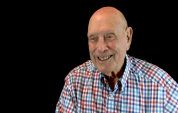7:50 | Hershel had seen a diagram aboard ship of the island of Iwo Jima; the basic layout and where the airfield was. Coming ashore the third day, his unit was stalled by a group of pillboxes blocking the way. His commander asked him if he could take some of them out with the flamethrower. What he did then resulted in him being awarded the Medal of Honor.
Keywords : Hershel Woody Williams Iwo Jima steak and eggs Higgins Boat 4th Marine Regiment Mount Suribachi tunnel pillbox airfield flamethrower

Hershel "Woody" Williams grew up on a dairy farm in West Virginia. No one in his family had yet served, but he knew he wanted to be a Marine. The dress blues worn by Marines on leave were mighty attractive, perhaps something on the minds of Marine commanders.
His older brother had joined the Civilian Conservation Corps and was not far from home. As soon as he was sixteen, Hershel Williams signed up, too, but he wound up in Montana, fencing in range land. He was there when Pearl Harbor was attacked and many of the boys who were of age went right into the Army. Hershel had to wait, which was fine because he wanted the Marines.
Hershel Williams had no trouble in boot camp, thanks to the upbringing by his no nonsense father. He did have trouble realizing he may have to actually kill someone else. Later, in combat, he would come up with a way to get past this. His training wrapped up at Camp Pendleton where he nearly missed shipping out with his unit.
The ship was crowded and hot. Marine Hershel Williams was headed to a destination unknown in the Pacific and he had worked out a system with his girlfriend to get past the censorship of letters home. When he learned the names of his first two destinations, he knew he was going to be writing some long letters.
The first stop for the new Marines was New Caledonia. They were only in transit so they had some free time and Hershel Williams and some buddies decided to go to the beach and get a coconut. Bad idea.
On a secured Guadalcanal, Marine Corporal Hershel Williams was selected to be a flamethrower and demolition operator. When the weapon was unpacked, it was a big mystery, but through trial and error, an effective method of use was devised. The results were deadly.
His gunnery sergeant was named Albert Daniel Hemphill. Hershel Williams remembers him as a "China Marine." They were a different breed and this story about a drunken leave in China comes straight from the source.
The flamethrowers were useless on Guam. There were no caves and pillboxes to speak of, just deep jungle. Hershel Williams set them aside after two days and got an M-1. Also, there were frogs, really big frogs.
What did Hershel Williams learn from his first combat experience on the island of Guam? His answer is thoughtful, but he is not so sure what to think about the Japanese code of honor that leads to Banzai charges and suicidal attacks.
Hershel Williams was wounded, but he refused to move to the rear on Iwo Jima. Once he saw that his friend Vernon Waters had been killed, there was no way.
He was preparing to cross the airfield on Iwo Jima when Hershel Williams heard Marines yelling. He looked up and joined in what would become an iconic moment, the raising of the flag on Mount Suribachi.
He had been designated to receive the Medal of Honor for his actions on Iwo Jima, but Hershel Williams had never read the reports or seen the citation. Since he had no memory of that fateful day, when he stood before the president, he was still unsure why he was there.
When Hershel Williams returned to Iwo Jima decades after the fierce battle, he carried a special flag taken as a souvenir. There was one Japanese visitor on the trip, a wheelchair bound veteran who had been captured there, disgracing himself by surviving. Could he help return the flag to a suitable place?
There are plenty of memorials to the brave service members who sacrificed their lives to win the war. But Hershel Williams was always bothered that there was little recognition of the families who sacrificed their loved ones. So he began to correct the situation.